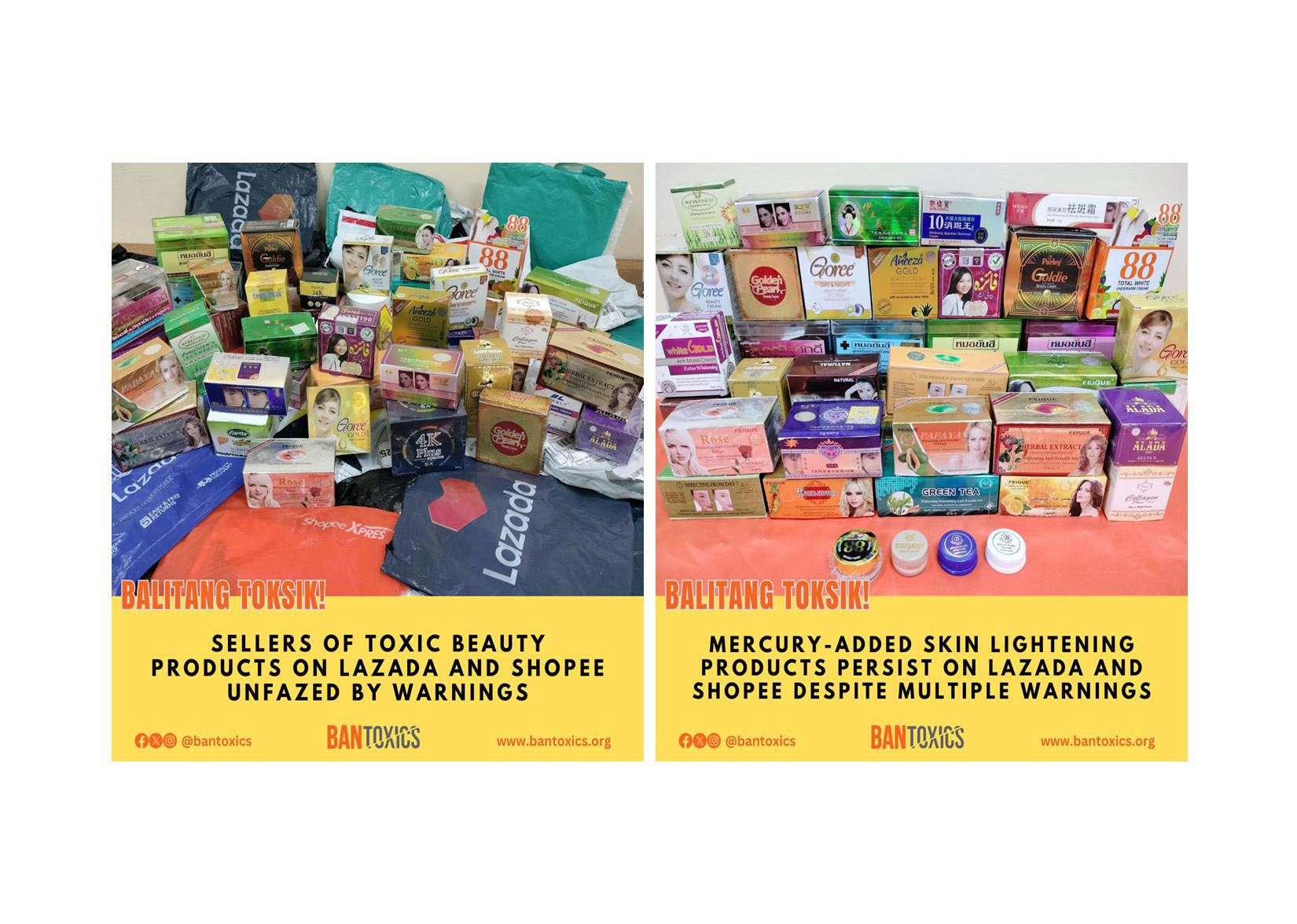BAN Toxics Calls Out Lazada and Shopee for Allowing Hazardous Beauty Products to Remain on Sale

Toxic watchdog BAN Toxics has once again called out popular online shopping platforms Lazada and Shopee for allowing the continued sale of banned mercury-added skin-lightening products.
“By allowing the unimpeded sale of these toxic beauty products, Lazada and Shopee are putting public health at risk. We urge these e-commerce platforms to strengthen their regulations and immediately remove all mercury-added products,” said Thony Dizon, Campaign and Advocacy Officer at BAN Toxics.
In a recent online market monitoring, BAN Toxics purchased 50 skin-lightening beauty products and screened them using a Vanta C Series XRF Handheld Chemical Analyzer. Forty-four of the samples tested positive for mercury, with levels ranging from 7 parts per million (ppm) to an alarmingly high 67,400 ppm—far exceeding the 1 ppm limit set by the ASEAN Cosmetics Directive.”
The top 10 products with the highest mercury concentrations are as follows:
- Lady Gold Super Whitening Cream with 67,400 ppm of mercury
- Best Beauty Cream (Blue Container) with 42,000 ppm of mercury
- Parley Goldie Beauty Cream with 24,900 ppm of mercury
- Dr Yanhee Facial Cream Set (Blue) with 23,800 ppm of mercury
- Dr Yanhee Facial Cream Set (Purple) with 21,800 ppm of mercury
- Aneeza Gold Beauty Cream with Avocado & Aloe Vera with 18,500 ppm of mercury
- Goree Day and Night Whitening Cream with 17,200 ppm of mercury
- Dr Yanhee Facial Cream Set (Red) with 13,100 ppm of mercury
- Goree Beauty Cream with Lycopene with 16,100 ppm of mercury
- Goree Gold 24K Beauty Cream with 16,000 ppm of mercury
Twenty-five of the samples have an existing public health advisory issued by the Food and Drug Administration (FDA) from 2013 to 2024, warning against their sale and use due to mercury content. The advisories highlight that potential hazards may arise from ingredients that are not permitted in cosmetic products or from contamination by heavy metals. The use of substandard and possibly adulterated cosmetics can lead to adverse reactions, including but not limited to skin irritation, itching, anaphylactic shock, and organ failure.
“Despite these health warnings, it has been ‘business as usual’ for the online shopping platforms, which continue to sell these prohibited products without hesitation,” Dizon remarked.
Mercury-added skin-lightening products exceeding the 1 ppm limit are also banned under the Minamata Convention on Mercury, a global treaty to which the Philippines is a party.
Mercury is considered one of the most toxic chemicals on earth. According to the World Health Organization (WHO), mercury and other hazardous substances in cosmetics can cause kidney damage, skin rashes, discoloration, scarring, increased susceptibility to infections, anxiety, depression, psychosis, and peripheral neuropathy. For expectant mothers, exposure to these toxins is especially concerning, as they can transfer to the developing infant through the placenta and breast milk, leading to lasting health risks.
“We call on Lazada and Shopee to comply with existing regulations. No one is above the law. Every seller, both onsite and online, must act with due diligence to prevent the further spread of mercury poisoning from such products,” said Dizon.
BAN Toxics also called on the Department of Trade and Industry (DTI) and the FDA to convene a multi-stakeholder conference to address the issue of fraudulent and health-damaging products in online shopping markets, and to strengthen commitment to providing safe, healthy, and toxin-free products for the welfare of consumers.
The group highlighted that Republic Act 9711, or the FDA Act of 2009, prohibits the manufacture, importation, distribution, and sale of health products, including cosmetics, without proper authorization from the agency.
Meanwhile, under Joint Administrative Order (JAO 22-01) Section 13, e-commerce platforms, e-marketplaces, and similar entities are required to verify whether the goods sold by online sellers, merchants, and e-retailers on their platforms are regulated, prohibited, original, genuine, licensed, or expired.
The JAO further states that, in case of a prima facie violation of any relevant laws or regulations by an online seller or merchant, the concerned authorized agency shall issue a notice, giving the violator a maximum of three (3) calendar days from receipt to remove the post. This is without prejudice to the filing of appropriate administrative actions against violators.
The group also reminded the public not to “add to cart” mercury-added cosmetic products to avoid exposure. Always verify products first using the FDA verification portal. For your health and safety, remember to “love your natural skin tone.” # (PR)







